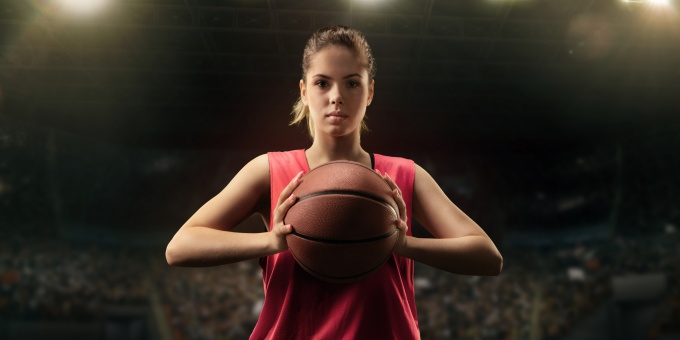
Student blog posts commemorate 50th anniversary of Title IX
The UB Law Sports & Entertainment Forum marked the 50th anniversary of Title IX of the Higher Education Act with the publication of a series of student blog posts reviewing the decades-old law in a new light.
The legislation, which famously bars discrimination on the basis of sex by any school that receives federal money, has greatly expanded opportunities for women in scholastic sports since its passage in 1972. But equal opportunity is a work in progress, and the student posts explore how Title IX might apply in such areas as compensation for college athletes, the treatment of transgender student athletes, and how one player’s TikTok campaign forced the NCAA to bring a measure of parity to its Division I basketball tournaments.
The special project, called “Title IX Turns 50: A Celebration or a Mid-Life Crisis?,” draws on papers from Professor Helen “Nellie” Drew ’88’s spring-semester course on Gender Equity in Athletics.
“These are important substantive issues,” says Drew, who also directs UB’s Center for the Advancement of Sport. “These conversations are important to drive social awareness and social change. While there have been substantial improvements in equality in a variety of ways—in particular, Title IX has given women the opportunity to participate in sports and to develop the skill sets and confidence that are so important for them in leadership roles—we need to recognize that challenges still exist.”
Drew says students who play a team sport learn invaluable “collaborative attributes.” “As a practical matter,” she says, “it’s an element that we expect our young boys and men will experience, but perhaps not so much our women and girls. They may not have that exposure. But women executives in particular point to their experience on the playing field and how important it was to them to have that opportunity to grow as a person.”
The legislation applies more broadly than sports, including on issues such as how colleges and universities should respond when a student alleges sexual harassment or assault. “One of the challenges is that Title IX has been a political football right from the get-go,” Drew says. “But we’re primarily trying to bring attention to issues that need to be considered,” including by members of the media who follow the blog site.
The Sports & Entertainment Forum is a project of the Buffalo Sports and Entertainment Law Society, whose president is rising third-year UB Law student Connor Johnson. “It’s been my favorite part of law school, because you stay up on relevant topics and can put your opinion right out there,” says Johnson, a former high school and college football coach.
He notes that the Department of Education has just released a set of extensive proposed revisions to Title IX, making it clear that even established law needs to be adapted to a changing world. “It’s more than athletics,” Johnson says. “We’re going through so many changes in our society that are education- and athletics-related. We like to think the law is perfect, but it has to be applied to certain situations. What Title IX has done should be preserved, and it should be the starting point for the next 50 years.”
Excerpts from the Title IX anniversary project:

Donnett Hickson ’23
Transgender girls and women competing in sex-segregating sports may result in a minor disadvantage for some cisgender female athletes. But any evidence that conclusively demonstrates trans women have a decisive and consistent athletic disadvantage over well-trained cisgender women has simply not been proffered. Allowing trans women to continue competing with their peers in women’s sports while studies and evidence are compiled is very much aligned with the spirit of Title IX and of the [International Olympic Committee’s] policy on inclusivity for the betterment of sport.
– Donnett Hickson ’23, “Fair Play? Who Can Really Say?”

Connor Johnson ’23
Further, at what point does an “academic-related” benefit no longer become academic? For example, do all passing GPAs qualify for the same amount of academic benefits? How long will a 4.0 swimmer receive a $2,990 check per semester knowing that a 2.7 football player receives the same amount? Similarly, how do football players and basketball players who may not qualify for a school’s academic program feel knowing they generate the revenue used to provide payment to the 4.0 swimmer (a sport that does not generate money)?
– Connor Johnson ’23, “Title IX’s Presence in the Player Compensation Era”

Brooke Leddon ’22
Sedona Prince used her social media platform to uncover the realities of what it is like to be a female Division I athlete during the NCAA Tournament. She showed the practice facilities, weight room, swag bags and food provided to the women players, while the men players posted about their lavish meals, extensive swag bags, state-of-the-art weight room, fully branded courts and so much more. The discrepancies were not the result of a few extra dollars spent on the men’s teams. The NCAA simply did not spend the same time and money on the women’s tournament as it did on the men’s tournament.
– Brooke Leddon ’22, “One TikTok Changed the Trajectory of the NCAA and Women’s Basketball"

Eddie Passero ’22
The protections LGBT students throughout this country receive seem to change on the drop of a hat. One year it seems that both the courts and the legislature are fighting for stronger protections, and then the next year the executive branch is rescinding whatever protections it previously granted and the court is holding protections are not applicable where they were previously. … While the greater equality and protections should be appreciated, the fight to keep them is far from over, nor have we reached a goal we should be fully satisfied with.
– Eddie Passero ’22, “Title IX Protections for LGBT Individuals”